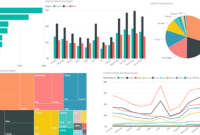BI business solutions revolutionize decision-making processes by harnessing data effectively. Dive into a world where insights drive success and innovation reigns supreme.
Explore the realm of BI solutions and discover how organizations can thrive in today’s data-driven landscape.
What are BI business solutions?
Business Intelligence (BI) solutions are tools and technologies that help organizations collect, analyze, and present data to make informed business decisions. These solutions assist companies in understanding market trends, customer behavior, and operational performance to optimize processes and achieve strategic goals.
How BI business solutions help organizations make informed decisions
BI solutions provide actionable insights by transforming raw data into meaningful information. By using data visualization, reporting, and analytics tools, organizations can identify patterns, trends, and anomalies in their data, enabling them to make data-driven decisions. These solutions help businesses across various industries improve efficiency, reduce costs, and increase revenue.
- Popular BI Tools:
- 1. Tableau: Known for its interactive data visualization capabilities.
- 2. Microsoft Power BI: Offers robust analytics and reporting features.
- 3. QlikView: Enables users to explore data and create dynamic dashboards.
- 4. IBM Cognos Analytics: Provides advanced analytics and AI-driven insights.
Types of BI business solutions

Self-Service BI vs. Traditional BI Solutions
Self-Service BI allows users to access and analyze data without the need for IT assistance, empowering non-technical users to make data-driven decisions. On the other hand, Traditional BI solutions involve IT professionals creating and maintaining reports and dashboards for end-users.
Advantages and Drawbacks of Cloud-Based BI Solutions
Cloud-based BI solutions offer scalability, flexibility, and cost-effectiveness as they eliminate the need for on-premises infrastructure. However, concerns about data security, compliance, and potential downtime are drawbacks associated with cloud-based BI solutions.
Role of Predictive Analytics in BI Solutions
Predictive analytics in BI solutions enables organizations to forecast future trends, identify patterns, and make proactive decisions based on data insights. By leveraging historical data and advanced algorithms, predictive analytics helps businesses anticipate outcomes and optimize strategies for improved performance.
Implementing BI business solutions

Implementing Business Intelligence (BI) solutions in a company involves a series of crucial steps to ensure successful adoption and utilization of data-driven insights. From data quality to governance, each aspect plays a vital role in the implementation process.
Steps involved in implementing a BI solution
- Assessment of business needs and goals to determine the scope of the BI solution.
- Selection of the right BI tools and technologies based on the company’s requirements.
- Data collection and integration from internal and external sources for comprehensive analysis.
- Development of data models and visualization techniques to present insights effectively.
- Testing the BI solution to ensure accuracy and reliability of the data.
- Training employees on how to use the BI solution for informed decision-making.
- Continuous monitoring and optimization of the BI solution to meet evolving business needs.
The importance of data quality and data governance in BI implementations
- High-quality data is essential for accurate analysis and decision-making within a BI solution.
- Data governance ensures that data is managed, secured, and compliant with regulatory requirements.
- Poor data quality and lack of governance can lead to misleading insights and ineffective decision-making.
- Establishing data quality standards and governance policies is crucial for the success of a BI implementation.
Best practices for ensuring successful adoption of BI solutions
- Engage key stakeholders from different departments to ensure alignment with business goals.
- Provide adequate training and support to users to maximize the benefits of the BI solution.
- Start with small pilot projects to demonstrate the value of BI before scaling up.
- Regularly communicate the impact of BI on business performance to drive user engagement.
- Monitor key performance indicators to measure the effectiveness of the BI solution and make necessary adjustments.
BI business solutions trends

In the ever-evolving landscape of Business Intelligence (BI) solutions, staying up-to-date with the latest trends is crucial for businesses looking to gain a competitive edge. From embedded analytics to AI-driven insights, these trends are shaping the future of BI solutions.
Embedded Analytics
Embedded analytics is a trend where BI capabilities are integrated directly into operational applications, allowing users to access insights without switching between different tools. This seamless integration not only enhances decision-making processes but also increases user adoption and engagement.
AI-driven Insights
AI-driven insights are revolutionizing BI solutions by leveraging artificial intelligence and machine learning algorithms to analyze data and generate actionable insights automatically. These insights help businesses identify patterns, trends, and anomalies in their data, enabling them to make informed decisions quickly and efficiently.
Mobile BI Solutions, BI business solutions
The impact of mobile BI solutions on business operations cannot be overstated. With the increasing reliance on mobile devices, providing employees with access to real-time data and analytics on the go is becoming essential for maintaining a competitive edge. Mobile BI solutions enable users to make data-driven decisions anytime, anywhere, leading to increased productivity and agility.
Future Direction and Innovations
Looking ahead, the future of BI solutions is expected to focus on advancements in areas such as augmented analytics, natural language processing, and self-service capabilities. Augmented analytics will empower users with AI-driven insights, while natural language processing will enable users to interact with data using conversational language. Self-service capabilities will continue to democratize data access, allowing users across organizations to explore and analyze data independently.
In conclusion, BI business solutions pave the way for a future where data is king and informed decisions lead to unparalleled success. Embrace the power of BI solutions and unlock a world of endless possibilities.
When it comes to BI data analysis , businesses rely on tools and techniques to make sense of their data. These insights help in making informed decisions and driving growth. Moving on to BI platforms , companies use these systems to gather, store, and analyze data from various sources. Lastly, Business intelligence software plays a crucial role in transforming raw data into actionable insights for organizations.
When it comes to BI data analysis , businesses rely on various tools and techniques to extract valuable insights from their data. These insights help in making informed decisions and driving growth.
Choosing the right BI platforms is crucial for businesses looking to streamline their data analysis process. These platforms offer a range of features to help organizations visualize and interpret their data effectively.
Implementing the right business intelligence software is essential for organizations to stay competitive in today’s data-driven world. These tools enable companies to gather, analyze, and visualize data to gain actionable insights.




